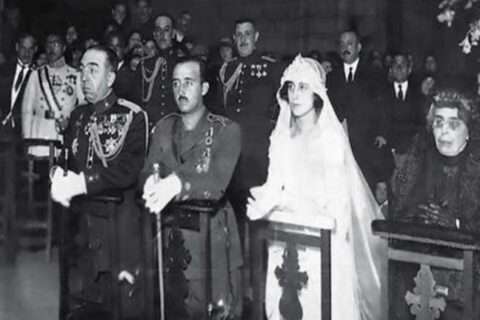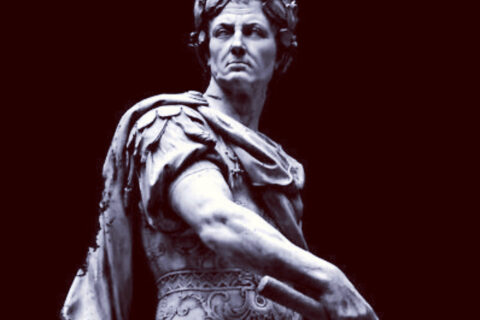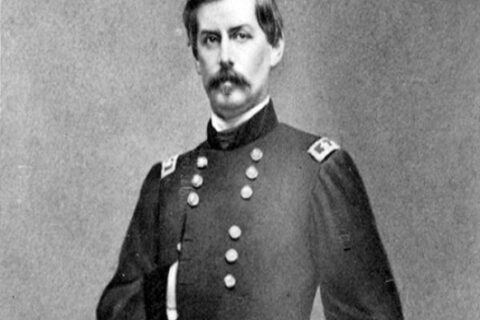With the news of Marine Le Pen doing well in the first round of the French Election but sadly losing in the run-off, I thought now a good time to do a light dive on the topic of French monarchism. Interestingly, there are three different factions of potential claimants to the throne. These are the houses of Bourbon (also known as the “legitimist” faction), Orléans, and Bonaparte.
The general outline of events is as follows: The house of Bourbon is a cadet branch of the now defunct house of Capet and was founded by a son of King Louis IX of France in 1272. It ruled France roughly from 1589 until the French Revolution. Napoleon rose up through the French Revolution to become emperor, but then a Bourbon restoration of Louis the 18th occurred. Louis died and Charles X succeeded him. Charles X was supplanted by the Orléans in the July Monarchy which lasted from 1830 to the revolution of 1848 in which Louis-Napoleon Bonaparte was elected president, then became emperor, and finally you get the third republic in 1870.
Napoleon is the best known of them, so let’s start with him. Napoleon Bonaparte was a member of a minor noble family in Corsica (interestingly, with six pointed stars as their main symbol on their coat of arms) and elevated himself primarily through his own resolve and military skill. There are many comparisons that can be made between he and Julius Caesar that I’m not going to delve into here because this article is going to be long enough. Looking at his rule and policies, it seems to be more pragmatism than conservatism that guided him. Even looking at the way in which he set the line of succession was unusual. He didn’t do primogeniture, but rather picked succession lineages based on how agreeable the individual person was to his aims. Obviously, it makes sense to not want a brother who opposed your rise to be your successor, but it would have made more sense to pass him and skip to his son, rather than to completely prevent that family line at all from succession. It may seem silly to hear that from any supporters of republicanism, but a major part of the success and legitimacy of monarchism is how much it honors tradition. The raw pragmatism of Napoleon was hardly traditional. You see that also in the way in which he crowned himself and even with some of the alleged statements behind the scenes whereby he made himself emperor, not because of any belief in it, but because it would solidify his power and gain him more prestige.
You can identify the pragmatism of Bonapartism largely in how he handled the Jewish question as well. In a private letter to his brother, he allegedly said “I have undertaken to reform the Jews, but I have not endeavoured to draw more of them into my realm. Far from that, I have avoided doing anything which could show any esteem for the most despicable of mankind.” He officially gave them equality and got rid of laws restricting them to ghettos, but also did what he could to assimilate them. It seems his view of religion in general was essentially to tolerate it so long as it didn’t undermine his power. Even the extent to which he rolled back the excesses of the French Revolution seemed largely to be for self-interested reasons. Equality was done away with, and a new aristocracy was created that would be loyal to him for stability.
There is perhaps no better encapsulation of Bonapartism than this line by Napoleon III referring to his cabinet: “The Empress is a Legitimist, Morny is an Orléanist, Prince Napoleon is a Republican, and I myself am a Socialist. There is only one Bonapartist, Persigny – and he is mad!” You have historians disagreeing about whether the Bonapartists were conservatives or liberals, but the reality is they were populists and pragmatists more than anything else. Perhaps opportunism is a better encapsulation of their position, rather than the conservatism inherent in the house of Bourbon or the liberalism which seems endemic in Orléans.
Discussing the Bourbons is a tricky subject. One would think that they would be the logical pick for monarchists today, but it is the house of Orléans which gets the most play. Perhaps part of this is because of how the regime ended. I am not going to defend the actions of Charles X or say he was a good or bad king, only that it did not make sense to depose him with a cadet branch. His son, Louis Antoine, was 55 in 1830 and would have made more sense to succeed him. That was what was done in the revolt against Paul of Russia, after all; Alexander I of Russia became the next tsar, not some cadet branch of the House of Romanov. The replacement of Charles X with a cadet branch indicates the sentiment of the time: paying lip service to tradition but ultimately embracing liberalism.
The house of Orléans was a cadet branch of the house of Bourbon. Historically, cadet branches gain power when the main line dies out due to no rightful heirs, as the House of Bourbon rose up when the Capets died off. In this case, there was an actual revolution against the rightful king, Charles X, and he was replaced/supplanted with the leader of the cadet branch, Louis Phillippe. Aside from supplanting the rightful king, Louis was a big fan of bankers and industrialists, particularly the Rothschild family.
Following the July Revolution, James de Rothschild gave loans to Louis-Phillippe and was elevated to a Grand Officer of the Legion of Honor. Rothschild certainly benefited from this arrangement: in 1815, the Paris Banking house had roughly £55,000 and by the 1878, it was £16,914,000.[1] Theories that the house of Rothschild was behind the July Revolution obviously make sense, given these ties. Additionally, according to The 48 Laws of Power, he allowed such men as Rothschild and industrialists to speak down to him. Is it any wonder, even if he was “conservative” that he weakened the legitimacy of the crown? He oversaw the creation of the French Foreign Legion which further eroded the notion of “the French” – from being a people to being just citizenship. Jumping ahead slightly, you see other issues with the men of this family in their falling out with Charles Maurras, who had supported them. Jean, Duke of Guise broke ties with Maurras’ Action block in 1937, losing supporters. His son, Henri, Count of Paris, launched a magazine, Courier Royale and was allied with anti-fascist “conservatives” like General La Rocque.
What of the current heads? Continuing on with the house of Orléans, the current head is Jean Carl Pierre Marie d’Orléans. He’s 56 but looks about 10 years older. He has several advanced degrees and has had good political positions like being pro-Yellow Vest, at least partially, and being opposed to abortion and gay marriage. He seems largely fine, but his father had quite a few issues.
His father, Henri (the son of the above Henri), had gotten divorced and then remarried to someone else, a divorcee herself, without his own father’s permission, initially being disinherited. Henri also was not allowed to walk his daughter down the aisle which indicates certain real bad-blood between the members of that family. Henri did other odd things upon becoming the head of the house. Henri annulled his father’s decision to deprive his brothers Michel (Count of Évreux) and Thibaut (the late Count of La Marche) of their succession rights because Michel married a noblewoman without permission and because Thibaut married a commoner.[. Henri became the grand master of the French Masonic lodge before becoming the head of the house of Orléans. I know we have masons in the Right here, but European masonry is a different animal. This is particularly true for French freemasonry.
Now you may want to say, this is all Henri, not Jean, so it’s not fair to hold him accountable, but the fruit doesn’t fall far from the tree. This is, after all, the reason why I discussed the historical origins of the houses in the beginning and the issues between Orléans and Maurras.
Moving to the house of Bonaparte, there are two claimants: Charles or Jean-Christophe. The dispute is somewhat moot as Jean-Christophe is the eldest son of Charles. Jean-Christophe’s grandfather wrote in his will that he wanted his grandson to succeed him rather than his son (due to concerns with Charles’ principles and a marriage the grandfather disapproved of). In any event, his father is 71, so whether the great-great-grandnephew or the great-great-great grandnephew of Napoleon I is the current head, it will likely be undisputed in the next few years. Both worked or work as bankers, with Jean-Christophe working for the Blackstone Group. Also, for some reason, Charles adopted a Vietnamese baby who is a princess Napoleon.
What about the house of Bourbon? Louis-Alphonse, also styled as Louis XX, has an interesting pedigree: he is the great-grandson of King Alfonso XIII of Spain, a great-grandson of Francisco Franco, and a great-great-great-grandson of Queen Victoria of the United Kingdom.
Louis is both a Spanish and French citizen. He has also spoken against abortion and gay marriage. He has identified himself as a monarchist and has indicated he would like to be king. Additionally, he’s opposed the movement of Franco’s tomb from its resting place in the Valley of the Fallen and even spearheaded a petition calling for the resignation of the prime minister of Spain at the time (I know, a petition isn’t much, but it’s a lot more than any of these other people are doing). Likewise, he has expressed support for the Yellow Vest movement and called for a return to “Christian Society” in a speech to the World Congress of Families.
There have also been disputes between the Bourbons and Orléans in recent years, such as the former head of the house of Orléans, Henri, suing the Bourbons over the use of the undifferenced royal arms and losing that lawsuit. This indicates that while these men are not in positions of power presently, they certainly do seek to effectuate something.
So, what does this mean going forward? Well, perhaps nothing. It is unlikely there will be a French Monarchist revival anytime soon. Still, it’s interesting to see the different streams of history and consider what may be.
A Southern man trying to make a good Southern plan.
Deo vindice!






Quick fix, the Capetian dynasty ruled France since the 1000’s, after the fall of the Carolingian dynasty.